Tesco boss Philip Clarke was brutally ousted on Monday after failing to halt a dramatic slide in sales and profits, and replaced by a little-known executive from Unilever with no retail experience.
Announcing Clarke's departure alongside a fresh profit warning, the company said Dave Lewis, who presides over brands such as Dove and Lynx as head of Unilever's personal care business, would take over as chief executive in the autumn.
The loss of office came out of the blue for Clarke, who was preparing to celebrate his 40th year at the company with a party in central London . This has now been cancelled. Clarke said it was an "emotional" time but that he had "nothing to regret" during his three year reign. "[The date] is not one of my choosing," he told the BBC.
Clarke, who joined the supermarket as a schoolboy shelf-stacker in 1974, is paying the price for failing to halt a slide in sales and profits during three years in charge. In that time he has spent more than £1bn revamping its UK stores and product ranges, yet failed to stem the tide of shopper defections to rivals. In the statement, Tesco warned that sales and trading profits for the first half of the year "were below expectations" despite a raft of store makeovers and price cuts.
When Clarke took over in March 2011 Tesco's UK market share was 30.7%, but today that has shrunk to 28.9%, according to research firm Kantar Worldpanel. During the same period, discounter Aldi has more than doubled in size to command a 4.7% share, while Lidl has increased its stake from 2.5% to 3.6%. The market positions of Sainsbury's and Asda – Tesco's main rivals – have remained largely stable.
Despite his failure to turn the business round, Clarke could walk away with close to £10m in cash and shares, according to proxy voting service Manifest. He has also amassed a £11.5m pension pot over his long career, and will continue to be paid his £1.1m salary for a year.
Tesco chairman Sir Richard Broadbent insisted Clarke's departure was not linked to the retailer's deteriorating financial performance. "The board's job is to look forward," he said. "Philip Clarke has been hugely successful in what he's done over the last three years. He's started the job of realigning the business."
Broadbent said the board was moved to act as structural change in the retail sector – which has seen big stores fall out of fashion – accelerated. "In these circumstances [we thought] the company might be better equipped with somebody with a fresh eye and the perspective to think more laterally and take a more decisive view of the business."
Patrick Cescau, Tesco's senior independent director, is understood to have been a key figure in bringing about change, having been a conduit for investors' frustrations with the retailer's deteriorating performance. Paras Anand, head of European equities at Fidelity Worldwide Investment and a Tesco shareholder, said Lewis's appointment, coupled with the recent hiring of Alan Stewart from Marks & Spencer as finance director, meant "shareholders now have the change they have been pushing for".
On Monday parallels were being drawn with the succession problems encountered at Manchester United, where Sir Alex Ferguson's success was followed by David Moyes's disastrous reign, with management theory suggesting outsiders are better at leading turnarounds. Unfortunately for Clarke, he is the Moyes to Sir Terry Leahy's Ferguson.
"The decision to appoint a chief executive from outside reflects that it can sometimes be hard for insiders, especially those who have been present when a business is doing well, to be adequately attuned to when problems emerge," added Anand.
Broadbent, whose leadership of the retailer has also been privately criticised by investors, declined to comment on the nature of the recruitment process or whether headhunters had been used. The company is thought to have been speaking to Lewis for some time. "Dave Lewis is a man who understands brands and one of the things people are always telling me is that nobody knows what Tesco stands for," said Broadbent.
Lewis, 49, has spent almost three decades at Unilever, and in his current role oversees a portfolio of shampoo and deodorant brands that includes supermarket favourites such as TRESemmé and Radox. He will officially take over the reins at the start of October, with Clarke due to stay on until the end of January. Lewis will earn a salary of £1.25m, plus undisclosed Tesco shares and benefits which are likely to push his pay far higher. He will also receive £525,000 in lieu of his Unilever bonus.
"I think Dave Lewis is a great hire for Tesco," said former Tesco board director Andy Higginson. "He's very seasoned and a successful manager. He's got great values and will be very strong on sorting the strategy out."
The new appointment was well received by the City, with Tesco the second biggest riser on the FTSE100, despite the profits warning, and shares closed up 1.28% at 288.6p. Shares in Tesco's rivals Morrisons and Sainsbury's lost ground though as investors took fright over the Tesco warning of a "weak" grocery market. In the wake of the profit alert analysts at Shore Capital pencilled in a 5-10% reduction in their profit forecast for Tesco's current financial year.
The departure of Clarke marks the end of the Leahy era. Leahy ran the business for 14 years and following his retirement the key architects of Tesco's success during the nineties and noughties, including Tim Mason, former UK boss Richard Brasher, Higginson and David Potts have left. The changes mean that Tesco will go into the crucial Christmas trading period with two new people in charge. Current finance chief, Laurie McIlwee, is due to leave in October although the grocer is yet to confirm the start date for Stewart who has been lured from M&S with a £1.7m golden hello.
Clarke, who reportedly had a tough management style, was a divisive leader and one Tesco insider argued his fate was sealed when he lost the confidence of its store managers. "There will be no tears being shed for him at Tesco," said the insider.
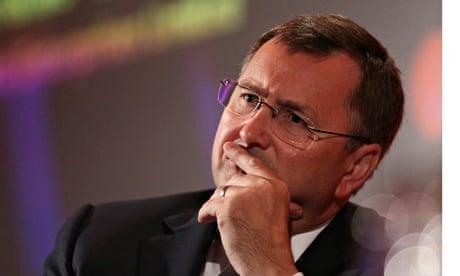
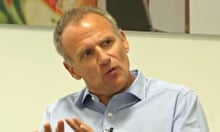



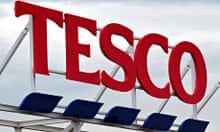
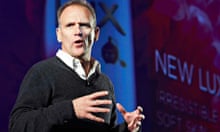

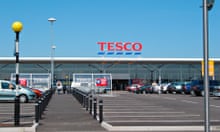
Comments (…)
Sign in or create your Guardian account to join the discussion